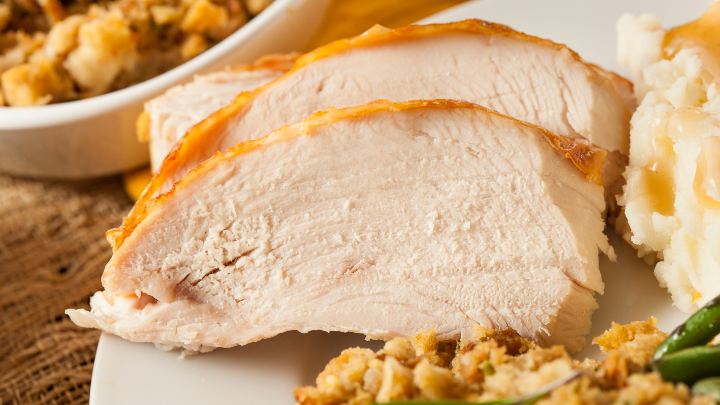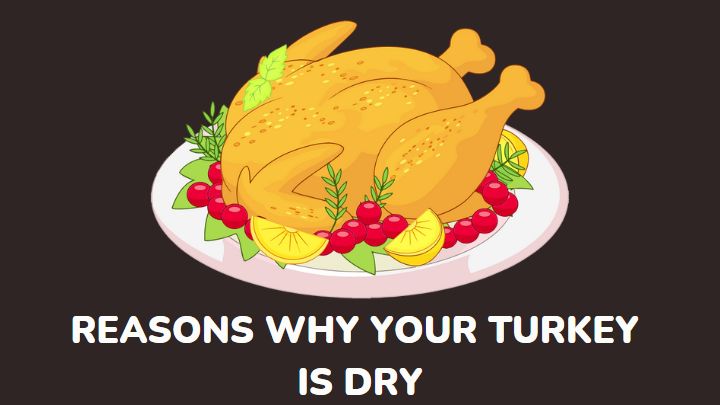Dried-out turkey makes a glum Thanksgiving dinner. And dry turkey never looks it until you slice through. Dry turkey always makes you feel like you wasted your time and ingredients. It happens to the best and worst of cooks.
There is a reason why your turkey comes out dry. These reasons range from the turkey to the cooking process. Let’s find out these reasons.
Also, this article will help you know what to do with dry turkey instead of throwing it out or eating it gloomily.
Why is your turkey meat so dry?

If you always end up with dry turkey meat, you’ve been cooking your turkey incorrectly. Here are some things you’re doing wrong and how to correct them:
1. Not allowing your turkey to sit after cooking
Carving and serving turkey immediately after taking it out of the oven is one of the common mistakes many home chefs make.
Turkey, naturally, loses a lot of moisture during cooking. Just like with your grilled steak, cutting turkey immediately will make the juices and more moisture escape and make it drier.
Leave the turkey to rest for at least 45 minutes to replenish some of the lost moisture and distribute the juices.
The next time you’re grilling or roasting turkey, allow it to go through this process, and you’ll find it more tender and juicier than before.
Ensure that your turkey does not sit out for more than two hours. Otherwise, you risk bacteria contamination. Also, do not cover the turkey while it’s resting. Doing this will make it reabsorb steam and come out mushy.
2. Cooking the turkey whole
Surprised? Yes, I wondered why too. You’ll agree that the beauty of roasting turkey, especially for Thanksgiving, is cooking it whole.
But, grilling experts say it may not be helping your turkey cook well. The different turkey parts contain different textures of connective tissues. Some cook faster while others take more time to cook.
For instance, the breasts cook faster than the legs and thighs. Consequently, cooking the turkey whole will overcook the breasts and make them dry out quickly.
You can avoid this by carving your turkey before cooking. Then, cook the different parts separately. Some turkey experts start cooking whole and remove the breasts earlier.
Carving a raw turkey is not very easy if the butcher does not do it for you. But, it could save you from ending up with a dry turkey.
3. You cooked a frozen turkey
Buying frozen turkey always looks like a great idea, especially if you’re not using it immediately. Well, it’s not as great as you thought.
The longer turkey freezes, the more moisture it loses and the higher the chances of getting dry turkey roast. The perfect turkey roast is one made with fresh, all-natural, organic turkey.
But, if you must freeze turkey before roasting, make sure it thaws completely before you roast. This should take 3 to 4 days, depending on the size of the turkey and how frozen it is.
Also, you can refrigerate the turkey instead of freezing it. Turkey can last 3 to 4 days in the refrigerator.
4. How did you season and butter?

Always ensure that you add butter and seasoning to your turkey properly and thoroughly. Yes, I know you used lots of butter, spices, and herbs on your turkey but it still came out dry. Perhaps you did not put butter under the skin.
Here’s how to: carefully loosen the skin from the turkey and rub the butter under the skin. Do this for the breasts, legs, and thighs. It’s even better to mix ground herbs and spices with the butter before putting it under the skin.
When you apply butter and spices to just the turkey skin, the moisture doesn’t penetrate the meat. Instead, it either condenses on the skin of the bird or completely rolls off. This is why your last turkey had juicy skin but dry and chewy meat.
Next time, properly butter over and underneath the turkey skin and ensure it properly marinates before roasting.
5. It’s probably the wrong pan
Not many people know this, but you should not just throw turkey into whatever is available. Henceforth, keep in mind that how well your turkey cooks and how well it retains its moisture largely depends on the size and type of pan.
A pan that is too high will make the breasts cook and dry out faster than the legs and thighs. And any part of the turkey that cooks for too long will most likely end up dry.
If you don’t have the perfect pan and do not want to take chances, use a roasting rack to make a perfect turkey roast.
6. Perhaps the turkey cooked in one direction
You should not cook any meat in one direction, especially in an oven or over direct heat. There are two reasons for this.
The first is, although you preheat your oven to a certain temperature, the heat distribution is not equal. Some areas may be hotter than others.
Also, the different parts of turkey meat are not of the same texture. Some parts cook faster and dry out more quickly than others.
Taking these two factors into consideration, you should turn the turkey in different directions during the whole cooking time to ensure it cooks well. Even cooking also helps the distribution of juices.
7. That big turkey!
A big turkey sounds good, especially when you have a large crowd to feed. For instance, a big turkey that weighs 20 pounds (lb) will feed more people and save you the time and energy you’d spend working on two 10-pound turkeys.
However, the larger the turkey, the longer it takes to cook, the more moisture it loses, and the drier it tends to be. A large turkey will cook unevenly. The outside will be well-cooked and the inside will not.
How can you overcome this? Take the extra time and work with two medium-sized turkeys.
8. Lack of extra moisture
After basting and marinating, you should add extra moisture (stock) while your turkey cooks. You’ll appreciate this hack better when cooking frozen and large turkeys.
Adding extra moisture is not compulsory but it can be very helpful. It enhances flavor absorption and reduces the chances of ending up with dry turkey meat.
9. Did you brine enough?
Sometimes, we say we brined turkey, but it didn’t change anything. Brining uses osmosis to season meat and stock it with moisture. Moreover, it works with time.
The longer you brine, the higher your chances of getting moist, juicy turkey. Wet or dry brining works perfectly.
To get the best out of your brining ingredients, brine for 24 hours. The longer you brine, the juicier your meat comes out.
10. Finally, you overcooked your turkey
Overcooking turkey means allowing it to lose too much moisture and juices. Some of the reasons you end up overcooking turkey have been listed earlier. Frozen turkey and large turkey would naturally take too long to cook.
A common misconception about cooking a turkey is to cook for longer to get it right. How well your turkey comes out depends on the temperature in the oven (of course, the brine and all other factors inclusive).
Cook your turkey with the following factors in mind: the size, whether it is stuffed or not, and the temperature in the oven.
Also, periodically use a meat thermometer to check the internal temperature. The breasts should cook to an internal temperature of 145-155°F while the legs and thighs should cook to 155-165°F.
How to fix dry turkey
Below is a list of things you can do to fix that dry turkey:
1. Restore moisture with broth
Preheat the oven to 200°F. Cut the turkey into slices and place it in an oven-safe dish. Then, pour the broth over it and cover the dish with aluminum foil. Warm it in the oven for about 10 minutes and serve hot.
2. Serve turkey with gravy
If gravy was not on your menu, you should introduce it now that you have dry turkey. Make a delicious gravy that will mask the dryness of the meat with moisture and flavor.
3. Freeze the turkey for later
You can also freeze the dry turkey for later. Use it to make turkey soups, turkey sandwiches, turkey mac and cheese, turkey cobb salad, turkey pasta bake, turkey tacos, stuffed potatoes, turkey shepherd pie, turkey carcass soup, or turkey casserole.
FAQs
Why does turkey dry out as it cooks?
Turkey is considered lean meat with a poor breast-to-leg fat ratio. The breasts have more fat than the legs. Consequently, they cook faster and dry out more quickly before the legs.
Although people love to cook turkey whole, the best way is to cook the parts separately.
Should you put broth at the bottom of the pan when cooking a turkey?
Yes, you should.
Adding chicken or vegetable broth to the bottom of your roasting pan will help to moisten it and enhance the flavor.
Is it better to cook a turkey at 325 or 350°F?
Both temperatures are good for cooking different sizes of turkey. Small turkeys should be cooked at 325°F, while big turkeys should be cooked at 350°F.
Most importantly, lower the temperature as you cook to ensure the meat is thoroughly cooked and does not dry out.
Conclusion
Now, which of the above reasons do you think is the reason why your last turkey roast came out dry? I believe you how to avoid them when next you’re cooking turkey.
Let me add that one fix may not get it done. Use as many preventive measures as you can.
Brine properly, use the right pan or a roasting rack, season and butter under the turkey skin, work with a smaller bird, turn the bird in different directions, do not overcook your turkey, and allow it to rest before you carve.
In addition, if cooking turkey whole is not compulsory, cut it into separate parts before cooking.
Most importantly, make sure your turkey cooks evenly. You can achieve this with turkey leg ties. Also, see a list of ways to tenderize tough meat cuts and make them more chewable.
Thanks for reading.
